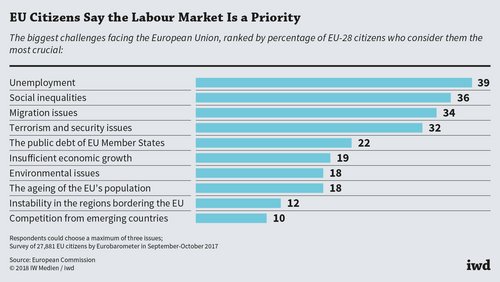The European Union should provide for more jobs, eliminate inequalities, and solve problems relating to migration. These are the results of a survey conducted by Eurobarometer.
Eurobarometer: The Challenges of the EU
Since even before the Brexit decision, sharp minds have been discussing the future of the EU. The citizens themselves have clear ideas as to which problems this international community needs to tackle.
According to Eurobarometer, 39 per cent of those surveyed consider unemployment to be the biggest challenge that the EU must face.
While that is 6 percentage points less than in autumn 2016, the subject continues to be a top priority for EU citizens. In addition, more thanover 60 per cent of respondents in Cyprus, Greece, and Spain believe that first and foremost, the EU must create more jobs.
According to the survey, reducing social inequalities is the second most important issue for the future. For 50 per cent of German citizens, it is even the EU’s Number One Problem . Moreover, nearly one out of every two people in Lithuania and Sweden think that the EU has a special obligation in this regard. On the other hand, it is the issue of migration that most concerns the citizens of Malta, the Czech Republic, Estonia, and Hungary.
In the opinion of those surveyed, the challenge that has grown most in importance is above all the issue of ecology: In autumn 2016, only 13 per cent of EU’s citizens ranked environment protection among the main topics; one year later, however, this figure was 18 per cent.
When asked what society needs to address in order to meet the global challenges, environmental protection even ranks second, named by 35 per cent of respondents. Only the issue of social equality and solidarity is more important for EU citizens when looking at the world - 45 per cent of those surveyed consider this the most socially urgent task. In contrast, only 23 per cent believe that the issue of free trade and the principles of a market economy should be given more prominence in order to solve global problems.
More on the topic
Not so Different?: Dependency of the German and Italian Industry on China Intermediate Inputs
On average the German and Italian industry display a very similar intermediate input dependence on China, whether accounting for domestic inputs or not.
IW
China’s Trade Surplus – Implications for the World and for Europe
China’s merchandise trade surplus has reached an all-time high and is likely to rise further. A key driver appears to be a policy push to further bolster Chinese domestic manufacturing production, implying the danger of significant overcapacities.
IW
